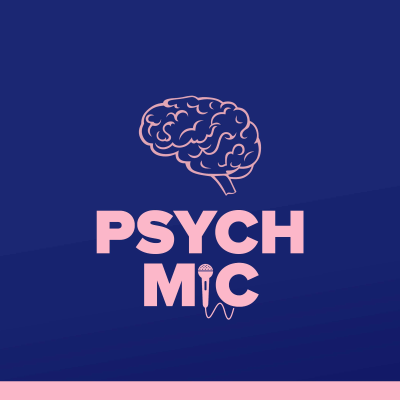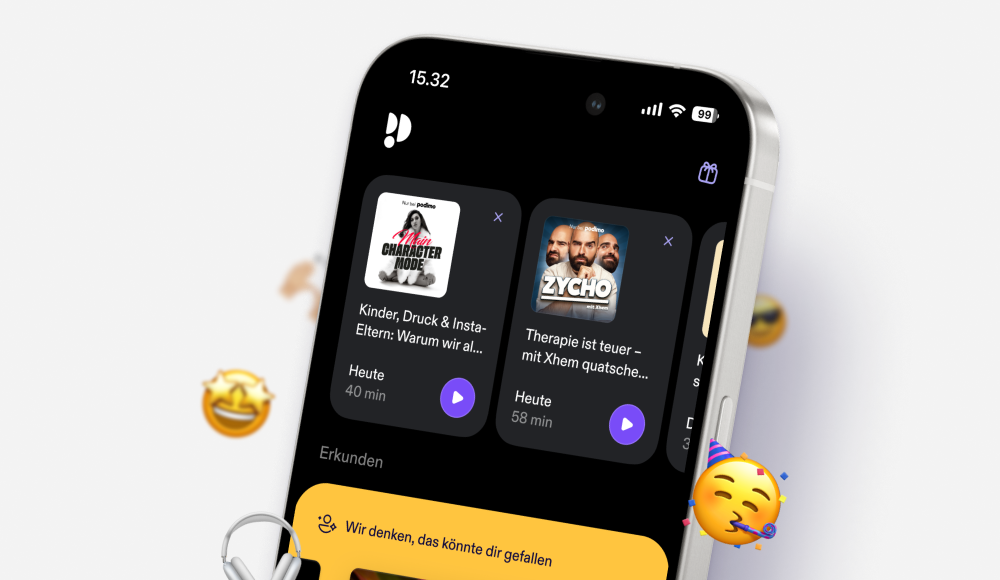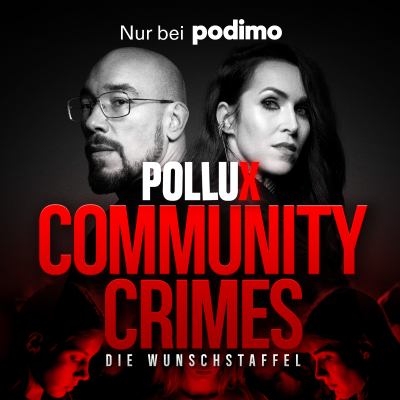
Psych Mic
Podcast von Maya Metser
Psych Mic is a podcast for psychology students to explore the endless ways they can use their psychology background to make an impact! In each episode, host Maya interviews an industry leader about their career path and advice for students. Because psychology is so widely applicable, it can be a challenge to figure out what to do next. These episodes will give you language to talk about your passions, uncensored tips about graduate school and career development, and lots of confidence in your psych background!
Nimm diesen Podcast mit
Alle Folgen
62 FolgenAline Holzwarth, MBA, is an applied behavioral scientist specializing in digital health research and scientifically informed product design. She is currently the head of behavioral science at Pattern Health and Principal at Dan Ariely's Center for Advanced Hindsight. She writes, "my training in psychology and business, and my experience in research and healthcare, have given her the kind of interdisciplinary lens that helps me appreciate the complexity of decision-making in the real world, particularly when it comes to the thorny domain of health. I am passionate about sharing behavioral insights with anyone who'll listen." See her website here [https://www.alineholzwarth.com/]. Resources: * Behavioral Science Graduate Guide [https://medium.com/behavior-design-hub/behavioral-science-graduate-guide-d096e0866b64] * Action Design Network [http://www.action-design.org/] * Habit Weekly [http://habitweekly.com] During this live interview (want to attend future ones? Sign up here [http://www.psychmic.com]), we cover: 1. What is behavioral science? 2. What is the “applied” piece? 3. The value of dabbling 4. Why didn’t you get a PhD? 5. Why did you get an MBA? 6. If you lack experience in behavioral science: how do you start acquiring relevant experiences? 7. What kinds of research experiences are applicable to behavioral science roles? 8. When did you own the title of behavioral scientist? 9. Examples of behavioral science in digital health 10. The future of behavioral science 11. The paradox that ALL (or at least most) jobs require experience 12. Entry-level job titles in behavioral science 13. Where to network with behavioral scientists 14. How do priorities of industry (e.g., profit, efficiency) impact your work? 15. Advice for switching fields 16. What piece of advice would you give your undergrad self? 17. What is one skill, quality, or general factor that has served you no matter where you went in life? Visit psychmic.com [http://www.psychmic.com/] to sign up for the newsletter, where you'll get career tips, grad school resources, and job opportunities straight to your inbox! Follow @psych_mic [http://instagram.com/psych_mic] on Instagram to submit questions for speakers and stay in the loop. Music by: Adam Fine [https://open.spotify.com/artist/7dkewWuVhUVyfQBOfKrL8F?si=NQkE0rLhRmG4ZiZMtzdzLA]
Access Psychology Foundation [https://www.access-psychology.org/] is a nonprofit that works to increase inclusion, equity, and diversity in the field of mental health by providing historically underrepresented communities with access to evidence-based prevention and treatment, and by training the next generation of racially diverse mental health providers. APF offers scholarships and grants to high school students, college students, graduate students, licensed professionals, schools, and organizations from historically underrepresented communities to help them: 1. gain exposure to the field of evidence-based clinical psychology 2. access high quality training and consultation in evidence-based treatments, and 3. access high quality training in working with clients of diverse backgrounds. APF also offers scholarships and grants to people from historically underrepresented populations so they can obtain quality, evidence-based mental health treatment. Evidence-based treatments are those subjected to rigorous research trials demonstrating their effectiveness. This episode is a conversation with APF co-founder, Alec Miller, PsyD, and APF Executive Director, Damian Travier. TO FIND OUT MORE: * The APF website [https://www.access-psychology.org/] is still under construction, but to find out more information about the opportunities discussed, you can reach out to Damian Travier at dtravier@access-psychology.com [jmazzotta@access-psychology.com] and mention that Psych Mic sent you! * Listen to the Psych Mic interview with Dr. Alec Miller to learn about his career path in clinical psychology here [https://www.psychmic.com/podcast/episode/49ee403a/pioneering-treatments-and-saving-lives-or-with-clinical-psychologist-dr-alec-miller]. We cover: * how APF was founded * why this nonprofit is so needed * the nature of the mental health crisis in communities of color * how APF is working to address the racial gap in mental health treatment and training * and how you can get involved Visit psychmic.com [http://www.psychmic.com/] to sign up for the newsletter, where you'll get career tips, grad school resources, and job opportunities straight to your inbox! Follow @psych_mic [http://instagram.com/psych_mic] on Instagram to submit questions for speakers and stay in the loop. Music by: Adam Fine [https://open.spotify.com/artist/7dkewWuVhUVyfQBOfKrL8F?si=NQkE0rLhRmG4ZiZMtzdzLA]
Amy Elliott, PhD, Chief Clinical Research Officer at Avera Research Institute [https://www.avera.org/research-at-avera/research-institute/], leads a research team focused on improving child health and development through community-based research. Dr. Elliott is the principal investigator on several National Institutes of Health (NIH) research projects including the Environmental Influences on Child Health Outcomes (ECHO) [https://www.avera.org/research-at-avera/research-institute/echo/] Study, an initiative to reduce infant mortality in American Indian communities. Dr. Elliott also holds professor and research positions at The University of South Dakota Sanford School of Medicine. Education: * PhD from Western Michigan University, Kalamazoo, Michigan, Clinical Psychology * MA from North Dakota State University, Fargo, North Dakota, Clinical Psychology * BA from Moorhead State University, Moorhead, Minnesota, Psychology Topics we cover: 1. If there was one thing you wish everybody knew about child development, what would it be? 2. Why did you go into clinical psychology instead of medicine? 3. Why did you get a master’s before your PhD? 4. If you loved research, why did you want to get licensed as a clinician? 5. How did you choose your PhD program? 6. What was your grad school research on? 7. Having a baby in grad school - unique benefits & challenges 8. Why did you want to work with children? 9. What did your training look like in graduate school? 10. What was the most valuable part of your PhD? 11. Advice for students interested in Amy’s line of work 12. What does a pre-doctoral internship in behavioral pediatrics and genetics look like? 13. Working on interdisciplinary teams 14. When and why did you transition away from clinical work and into full-time research? 15. “What got you here won’t get you there” 16. Amy’s role at Avera Research Institute: Research & findings, leading a team, day in the life 17. What is one skill, quality, or general factor that has served you no matter where you went in life? Visit psychmic.com [http://www.psychmic.com/] to sign up for the newsletter, where you'll get career tips, grad school resources, and job opportunities straight to your inbox! Follow @psych_mic [http://instagram.com/psych_mic] on Instagram to submit questions for speakers and stay in the loop. Music by: Adam Fine [https://open.spotify.com/artist/7dkewWuVhUVyfQBOfKrL8F?si=NQkE0rLhRmG4ZiZMtzdzLA]
Jill Stoddard, PhD, is the director of The Center for Stress and Anxiety Management [http://www.csamsandiego.com/] in San Diego. She received her PhD in clinical psychology from Boston University where she trained at the renowned Center for Anxiety and Related Disorders; it was there that her passion for treating anxiety using evidence based methods took root. Dr. Stoddard specializes in the treatment of anxiety and related disorders and has expertise in Acceptance and Commitment Therapy and Cognitive Behavioral Therapy. She is an award winning teacher, peer-reviewed ACT trainer, author, and co-host of the popular Psychologists Off The Clock podcast. She’s written 2 books based on Acceptance and Commitment Therapy: The Big Book of ACT Metaphors: A Practitioner’s Guide to Experiential Exercises and Metaphors in Acceptance and Commitment Therapy [https://jillstoddard.com/shop/izs3qilbomohqu0utp7vplgx4dpdf8] and Be Mighty: A Woman’s Guide to Liberation from Anxiety, Worry, and Stress Using Mindfulness and Acceptance [https://jillstoddard.com/shop/be-mighty-a-womans-guide-to-liberation-from-anxiety-worry-and-stress-using-mindfulness-and-acceptance]. When she’s not writing, counseling her fierce clients, speaking, or podcasting, she’s spending time with her amazing family, friends, and dogs, and feeling grateful for her mighty life. To learn from Dr. Stoddard, visit her website at https://www.jillstoddard.com/ [https://www.jillstoddard.com/] and follow her on Twitter (@jill_stoddard [https://twitter.com/jill_stoddard]), Instagram (@jillastoddard [https://www.instagram.com/jillastoddard/]), and Facebook/LinkedIn. Topics we cover: 1. Why clinical psychology? 2. How do you know you’re suited for clinical work? 3. What do you wish you knew as an undergrad in psychology? 4. What makes you want to mentor someone? How do I ask for someone’s time? How to I prove I’m worth it? How can I be a good mentee? 5. Why did you do a master’s in clinical psychology before your PhD? 6. What was the most valuable part of your MA program? 7. Jill’s first clinical experience & the goosebumps that proceeded 8. Imposter feelings & getting into grad school - what did it feel like? 9. Imposter “subtypes” 10. How does imposter syndrome still show up for you? 11. What is Acceptance and Commitment Therapy? Where can people learn more? 12. Why did you go into anxiety? 13. What appealed to you about being a private practitioner and owning a clinic? 14. Financial stability in private practice & being a business owner 15. Salaries throughout Jill’s career 16. What still gives you chills? 17. Jill’s upcoming book on imposter syndrome 18. What is one skill, quality, or general factor that has served you no matter where you went in life? Resources mentioned: * POTC episode [https://open.spotify.com/episode/51DHrE0XfEWffZRUbI51Ot?si=voXJynh0QbqBs_9X9HnJ2Q] with David Smith, about how men can be allies to women in the workplace * Jill’s Ted talk [https://www.youtube.com/watch?v=efXDYu0LYe4&ab_channel=TEDxTalks] * Jill’s website [https://jillstoddard.com/] * The Big Book of ACT Metaphors [https://jillstoddard.com/shop/izs3qilbomohqu0utp7vplgx4dpdf8] * Be Mighty [https://jillstoddard.com/shop/be-mighty-a-womans-guide-to-liberation-from-anxiety-worry-and-stress-using-mindfulness-and-acceptance] Visit psychmic.com [http://www.psychmic.com/] to sign up for the newsletter, where you'll get career tips, grad school resources, and job opportunities. Follow @psych_mic [http://instagram.com/psych_mic] on Instagram! Music by: Adam Fine [https://open.spotify.com/artist/7dkewWuVhUVyfQBOfKrL8F?si=NQkE0rLhRmG4ZiZMtzdzLA]
Tim Davis, PhD, is associate professor of public policy at the Frank Batten School of Leadership and Public Policy and the Director of Leadership Coaching for BattenX, the executive training program. A clinical psychologist, Tim helps students, executives and teams achieve more by building resiliency, community and self-awareness. At Batten, he teaches courses on team leadership, group dynamics and emotional resilience. Davis’s leadership courses at Batten emphasize practical, experiential learning to build self-awareness. His students form teams to experiment with using different approaches to solving problems they experience as team members and leaders. His resilience-focused courses use the transition to and from college as a place for students to learn emotional resilience skills, life management skills, and foundational leadership skills that will help them deal with setbacks and career changes. Prior to joining Batten, Davis served as the Executive Director for Resilience & Leadership Development at the University of Virginia. He also previously served as the Director of the UVA Center for Counseling & Psychological Services and as Director of Clinical Services at the University of Michigan Counseling & Psychological Services Department. Education: * Executive Coaching Certification from Georgetown University’s Institute for Transformational Leadership. * PhD in counseling psychology from the University of Maryland, College Park * MA in counseling psychology from Arizona State University. * BA in journalism & history from Indiana University Topics we cover: 1. The bathtub epiphany moment that led Tim to psychology 2. Why Tim wanted to help people as a therapist 3. Getting rejected from “safeties” but accepted to the #1 counseling psych program 4. Tim’s attitude toward research in grad school 5. Choosing a clinical path after grad school 6. Why Tim got training in more severe psychopathology 7. What Tim learned about college student mental health after working at 4 separate university counseling centers 8. The adolescent brain 9. The crisis of college mental health centers 10. Why Tim stepped away from his clinical positions 11. What piqued Tim’s interest in leadership and resilience? 12. How Tim fosters leadership, resilience, and emotional wellbeing for thousands at UVA through his courses 13. How are leadership and resilience related? 14. Can everyone be a leader? 15. What is Tim’s definition of leadership? 16. How is Tim’s clinical background still serving him? 17. What is one skill, quality, or general factor that has served you no matter where you went in life? Visit psychmic.com [http://www.psychmic.com/] to sign up for the newsletter, where you'll get career tips, grad school resources, and job opportunities straight to your inbox! Follow @psych_mic [http://instagram.com/psych_mic] on Instagram to submit questions for speakers and stay in the loop. Music by: Adam Fine [https://open.spotify.com/artist/7dkewWuVhUVyfQBOfKrL8F?si=NQkE0rLhRmG4ZiZMtzdzLA]

App downloaden & deine Podcasts überall hören









